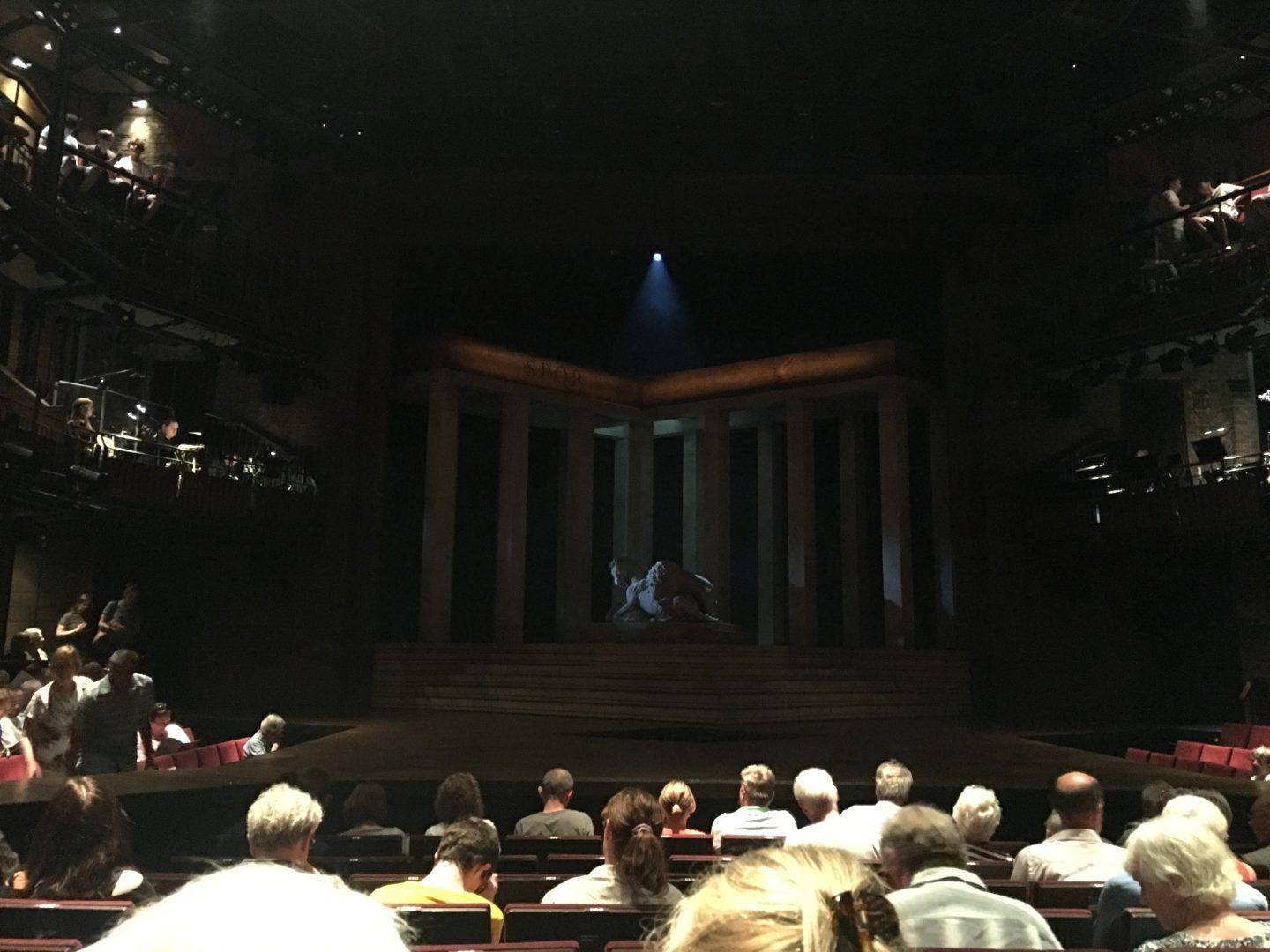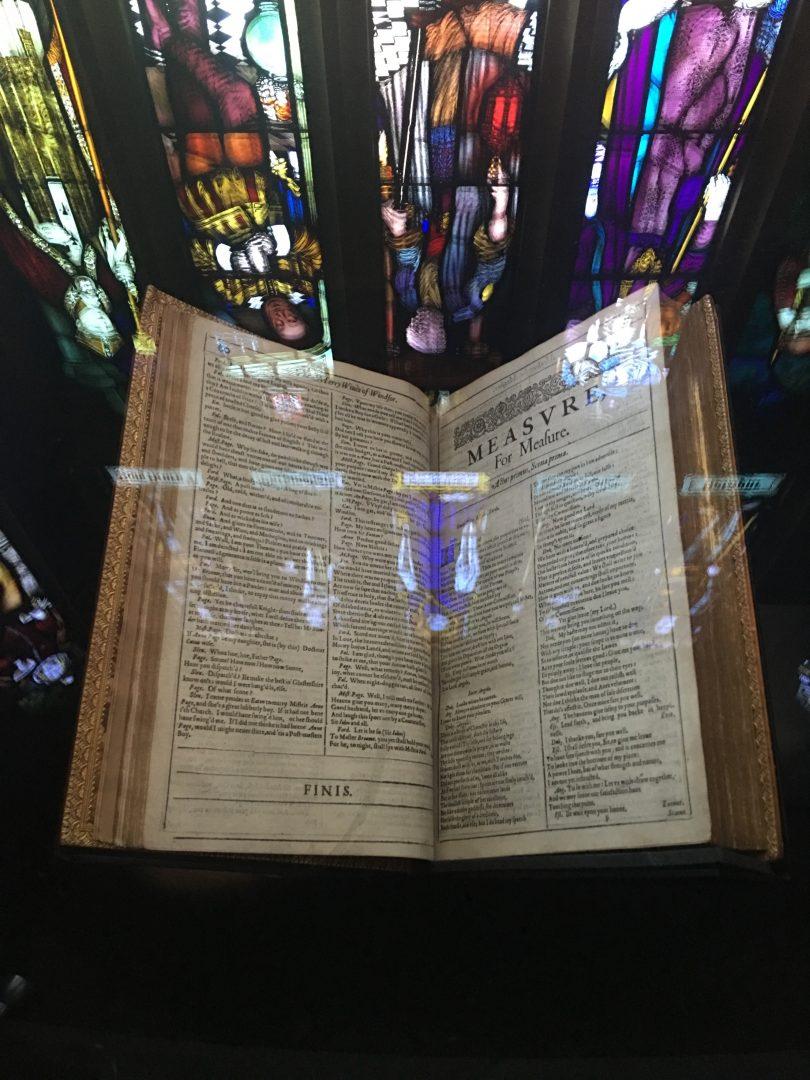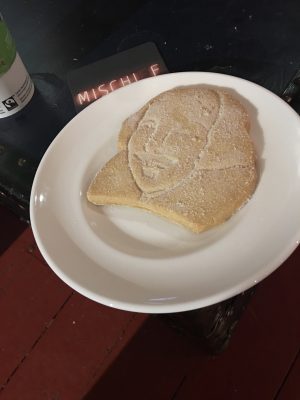A Weekend in Stratford-Upon-Avon
Stratford has really capitalized on its Shakespeare connection. You can find a “Shakespeare-shaped” anything! (THOMAS ZACHAR/ THE OBSERVER)
June 29, 2017
SATURDAY
9 a.m.: I woke up in a rush, ready to get to Stratford-Upon-Avon. It was Saturday, June 17. All of my Fordham friends had abandoned me to take weekend trips to places like Copenhagen and Paris, so I had planned a full weekend of theatre for myself. My theatre marathon had begun the previous night with “Hamlet” starring Andrew Scott. I had three more shows to see before Monday, two in Stratford and a Sunday matinee of “Incident at Vichy” at the King’s Head Theatre back in London. All that was on my mind was getting to them on time and following the tight schedule I had to keep. So I got dressed, pulling up my knee-high Shakespeare socks, as one does, and took the tube to London Marylebone train station.
10 a.m.: I left London Marylebone station on a train, excited and impatient for my arrival in Stratford. I had one train switch and was a bit worried about which platform to go to, but I just followed the crowd since almost everyone on my train was also going to Stratford. I found it’s common for Londoners to take their weekend out to the Land of the Bard for some good theatre viewing.
12:30 p.m.: It was 15 minutes from the Stratford station to the cute little house I had reserved from AirBnb for the night. The house looked old and wooden, like something of Shakespeare’s time, and was finished with a pretty blue door. It was a quiet little street, and I passed many tiny houses that also doubled as B&Bs. I got my house key and headed to the Royal Shakespeare Theatre.
I took my stroll through the town. There was something magical about it, and there is a reason why it instantly became my favorite place on earth. Stratford-Upon-Avon is a small market town that has preserved most of its buildings in the old wooden fashion that they would have been in in Shakespeare’s day. It’s an easily walkable town, carrying everything from decades-old family-run candy shops to rowdy pubs with signs outside saying “Have a Shakesbeer!” The town centers around the River Avon, with the beautiful Royal Shakespeare Theatre sitting alongside it. Along the river there are rowboats for rent, a ferris wheel and multiple outdoor music venues. If you head out there on the weekend, there will also be a multitude of pop-up tents and food stands, and families will fill the grassy areas as they sit and watch all of the outdoor entertainment.
1:00 p.m.: Not a week before coming to Stratford, I had learned about a program that the Royal Shakespeare Company (RSC) has called the RSC Key. If you are aged 16–25, you can sign up and see any of their shows for £5. So at £5 I sat in third row stalls—what we call the orchestra— at the Swan Theatre for a showing of Phil Porter’s “Vice Versa,” a play being put on for the first time at Stratford. “Vice Versa” was a new hilarious comedy set in Roman times about a comical and narcissistic tyrant, General Braggadocio, and the people under his rule attempting to escape his kingdom. To keep continuity in their “Rome” season, the RSC has put on a lot of Shakespeare’s tragedies such as “Julius Caesar” and “Antony and Cleopatra.” “Vice Versa” is being put on to lighten up the season’s heavier plays, and it did an excellent job of making the audience roll laughing in their seats. They even managed to slip in a Trump bash or two, which were witty and had the audience in applause.

4:45 p.m.: I left the Swan for The Other Place, another theatre a few minutes’ walk away, also owned by the Royal Shakespeare Company. Compared to the main Royal Shakespeare Theatre, The Other Place is a smaller venue that became famous in the ’60s. It was originally intended for new small-budget shows and new actors to get a chance in the spotlight. It has since been performed in by many famous actors such as Sir Ian McKellen, Dame Judi Dench and Sir Patrick Stewart. The RSC has remodeled the space, adding a cafe and multiple theatres. Having arrived a little early, I took a look at the cafe and bought a treat I couldn’t pass up—a cookie in the shape of Shakespeare’s face.
A group of five, including myself, all met a sweet tour guide who seemed ecstatic to take us on an hour’s tour of the space for only £8. We were first taken to a large rehearsal room, where every single play that is put on at the RSC rehearses before going into full production. It was nothing more than a large wooden soundproofed room, with 30 chairs in a circle, but it was full of energy. Just thinking of the many actors who had rehearsed in this room over the past years, both ensemble and famous stars, put tears in my eyes. Our guide then brought us to the costume room, which held over 30,000 costume pieces of all kinds—doublets to dresses— from past performances. We were then finally brought into one of the small theatres they were currently using. They were currently putting on a double bill, two new one-act plays by Tom Morton-Smith (“The Earthworks”) and the duo of Matt Hartley and Kirsty Housley (“Myth”). Sadly I couldn’t see these plays, as I already had plans for the evening.
7:00 p.m.: After the tour, I sat outside of the theatre and ate an inexpensive fish and chips dinner from Barnaby’s on Sheep Street, a 30-second walk from the theatre’s front door. After waiting all day, the time had finally arrived to go into the main Royal Shakespeare Theatre and see “Julius Caesar.” I hadn’t touched the play since early high school, and we’d never finished it, so I was very excited to see the full story for the first time. This was the second show I’d seen that day for only £5, and I had a great stall’s view of the beautiful Roman set when the show began.
10:30 p.m.: I walked out after the show in awe of everything. The lighting, set, actors and of course writing were all brilliant. Taking a stroll along the River Avon, I took my time getting back to the house with the blue door. I went to sleep having enjoyed my day in Stratford. I had prepared to get up early for the train back to London for the following day’s play, but I wished I could have spent more time where I was. Unfortunately, I had a tight weekend schedule, and a matinee to be at the next day.
SUNDAY
10:10 a.m.: I sat on a bench at the Stratford train station with my face in my hands, defeated. I’d had such a good weekend up until now. I had spent the last hour getting up early, sprinting through muggy weather in yesterday’s clothes and missing breakfast to get on my train back to London. But I had mixed up my train schedules. The next train back to London wouldn’t be for two hours, and by the time I would arrive, my matinee would have started 40 minutes prior. There was nothing more I could do, so in the words of Shakespeare, I put my “better foot before” and went back into Stratford. I had gone to sleep wishing for more time in this quiet peaceful town, and even though it accidentally came true, I was going to make the most of this day.
11:30 a.m.: My morning up until now had been spent taking things slow. This was a relaxed and easygoing town. So I took on that pace and just enjoyed it. I strolled by the cute shops and walked past the house where Shakespeare was supposedly born. I got myself a delicious cup of coffee from a place called Box Brownie Coffee, and sat on the river. I read a bit of the play “The Earthworks” I had picked up at the RSC’s gift shop. They had been selling their newest festival playscripts for 50p (half a pound) each, and there was no way I was turning that offer down. I had also struck up a conversation with a couple I met sitting along the river. They told me how they often came to Stratford on the weekends, not for the paid show-watching, but rather the free people-watching. We watched families struggle to row both down and incorrectly back up the river. Frustrated parents argued while rowing boats backwards as their kids sat disinterested, and people rowed obliviously into brick walls. Dates were ruined as boys attempted to impress girls and ended up rowing in circles and getting caught in the stream of the river.
1:00 p.m.: Originally, I wouldn’t have had the time, but with a whole extra day added, I couldn’t miss Stratford’s new exhibit, “The Play’s the Thing.” For £8, you can see how this exhibit celebrates the past 100 years of theatre-making in Stratford-Upon-Avon. I got to look at one of the last remaining “First Folios” in the world. The First Folio is the original book that includes all of Shakespeare’s plays put together, and is the only reason why we still have his playscripts today. I also saw costumes worn by famous actors in different productions they had performed in at the RSC. There were notebooks filled with rehearsal notes on top of old fashioned props used in decades-old productions. One of my favorite parts was the interactive booth. You step into this one person booth, and you become Hamlet. A large screen in front of you puts you onstage at the Royal Shakespeare Theatre, and you are prompted lines on the bottom of it. You perform a dialogue as Hamlet in the famous scene where he speaks to his father’s ghost for the first time, and walk out of the booth after a round of applause.

3:30 p.m.: Boarding the train, I put on my headphones and continued reading “The Earthworks”. I had missed a show in London, but my overstay in Stratford threw me out of my schedule-based anxiety, reminded me to enjoy life in the moment and allowed me to educate myself more about my passion for theatre.













